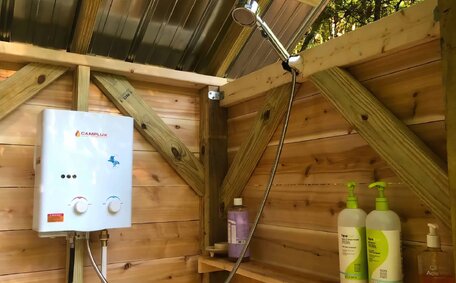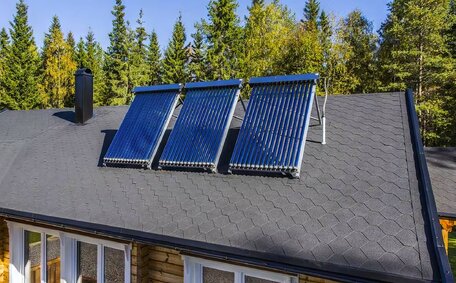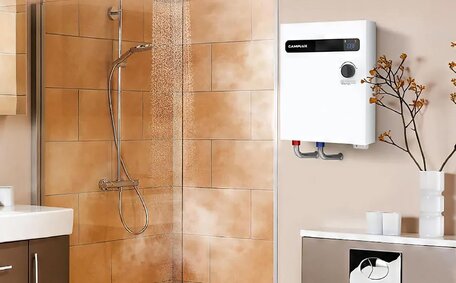Introduction to Gas Appliance Disposal
Safely disposing of old gas appliances is crucial for both environmental and safety reasons. Most household appliances have a functional lifespan of around 10 to 15 years. After this time, they should be properly disposed of to avoid potential dangers.
Old gas appliances, like stoves, hot water systems, and room heaters, often contain materials that can be harmful to the environment if not disposed of correctly. Gas itself can contribute to air pollution and climate change if released. Proper disposal ensures these greenhouse gases are not released into the atmosphere.
This guide, curated by a licensed gasfitter, will walk you through several ways to get rid of your old gas stove and other appliances safely and sustainably. We’ll cover how to prepare different appliances, where to drop them off, what recycling options exist, and when to seek advice from professional assistance to dispose old appliances. Following these proper disposal procedures is essential for protecting yourself, your family, and take your home safety seriously, which includes gas cylinder disposal.
Proper disposaaks, explosions, poisoning, and pollution.
Attempting DIY disposal of your old appliances without turning off your gas supply can escalate risks, leading to dangerous gas leaks. This invisible threat can cause explosions when ignited by a spark or flame, ensuring there no risk in how you dispose of your air and gas appliances. Inhaling unburned gas can also lead to serious health issues like suffocation, coma or even death, which underscores the importance of careful disposal of your appliances in the fresh air.
Failing to properly dispose gas cylinders, including emptying your butane canister of any your remaining fuel, makes them potential combustion hazards. Any of your residual gas or vapours can ignite during rubbish collection or at waste facilities, endangering workers and surrounding communities.
You can do a thorough chemical cleanout and practice careful handling of hazardous components inside your white goods and old gas appliances. Refrigerants, insulation materials, and all types of chemical residues such as mercury must disposed of correctly to prevent pollution of soil and waterways. Heavy metals and other toxic substances from your old white goods can leach out and cause environmental contamination.
In Australia, disposal of pressurised LPG cylinders into general waste is prohibited by law under the National Environment Protection (Movement of Controlled Waste between States and Territories) Measure. Attempting to dispose of old gas items in your regular curbside rubbish collection can result in significant fines and improper gas cylinder recycling.
Frequently, a reliable way to get rid of your old appliances is to reach out to a licenced gas fitter to manage the removal and decommissioning for peace of mind. Alternatively, check with your council regarding actions you can undertake with available hazardous waste facilities for cylinder recycling, or you can explore a way to get rid of your old appliances that use gas and ageing systems through approved services.
Safety Risks of Improper Gas Appliance Disposal
Improperly disposing of old gas appliances poses serious safety hazards that should not be overlooked. Mishandling gas cylinders, connections, and piping creates significant risks of gas leaks, explosions, poisoning, and pollution.
Environmental Impacts of Gas Appliances
Gas appliances that are not properly disposed of can have negative impacts on the environment. Here are some of the main concerns:
- Greenhouse gas your emissions - Methane, a predominant component in natural gas, takes the form of emissions from dryers air conditioners, and is i>Refrigerant releases - Dispose of your air conditioner and other appliances often contain ozone-depleting refrigerants like CFCs, which must be handled carefully for environmental protection. There should be no release into the air, hence these appliances must be professionally drained before disposal.
- Heavy metal contamination - Gas appliance parts such as burners, thermostats and tubing can contain heavy metals like mercury and lead. If leaked into soil or waterways, these toxins can be very harmful and cause environmental damage.
- Plastic pollution - The large amount of plastic used in gas appliances items can take many years to break down in landfills. Improper disposal causing materials to land in the landfill bin not only exacerbates plastic pollution but also risks releasing harmful substances into the atmosphere.
The best way to guarantee efficient waste recycling for outdated gas appliances and maximise environmental benefits is to eschew landfill disposal altogether. Recycling gas appliances through scrap metal facilities or embracing waste management strategies where you can recycle materials ensures they can be reused or can recycled safely. Contacting a licenced technician can help you learn more about the safest method to dispose of your air and gas appliances.
Taking the time to properly dispose of small appliances reduces greenhouse emissions, keeps plastic and toxins out of landfills, and protects the planet for future generations. Small actions focused on energy efficiency can make a lasting impact on sustainability efforts.
Gas appliances that are not properly disposed of can have negative impacts on the environment.
Preparing Gas Appliances for Disposal
Properly preparing gas appliances before disposal is crucial to safely recycle your units. Here are some key steps:
Stoves and Cooktops
- Turn off the gas supply at the mains or cylinder to safely cut off gas supply and get rid old gas appliances.
- Ensure all knobs are in the off position.
- Detach rubber hoses and gas canister fittings.
- Remove any remaining gas bottles or gas canisters.
- Clean surfaces thoroughly.
Hot Water Systems
- Shut off the gas supply and switch off any electrical supply.
- Drain the tank completely.
- Detach gas your heater and gas supply are switched off.
- Remove any remaining gas cylinders.
- Detach flexible gas lines.
- Clean exterior and interior thoroughly.
Always make sure to have a licenced professional decommission gas appliances whenever possible. Seek council advice on handling and transport rules for disposing of gas cylinders, tanks or fittings. Remove doors on fridges and freezers, and keep appliances dry before drop-off to prevent mould.
Preparation is key - following gas, water and electrical cut-off procedures minimises safety risks. Getting gas appliances disposal-ready takes a bit of effort, but is essential for environmental and personal safety.
Professional Removal and Recycling Services
For safe and proper disposal of gas appliances, it’s highly recommended to use professional removal and recycling services.
Gas companies like Cranebrook Plumbing can assist with the full decommissioning and removal of old gas appliances. Their licenced technicians will ensure gas supplies are correctly shut off, cylinders emptied, and fittings detached according to regulations.
Professional services also offer recycling and disposal options specifically for gas appliances. Rather than sending devices to landfill, recycling allows metal and plastic components to be reused.
Older appliances that use ozone-depleting refrigerants will have these greenhouse gases safely captured by professionals, preventing release into the atmosphere.
Professional services using test stations and gas detectors to identify leaks before and after removal can provide peace of mind and identify potential risks.
Consulting with qualified gas experts like Cranebrook Plumbing showcases your commitment to safety, ensuring a smooth and responsible disposal process.
For safe and proper disposal of gas appliances, it’s highly recommended to use professional removal and recycling services.
Gas companies like Cranebrook Plumbing can assist with the full decommissioning and removal of old gas appliances.
Local Waste and Recycling Facilities Accepting Gas Appliances
In the Cranebrook area of Sydney, there are a few options for properly disposings, and other gas appliances for safe disposal. Fees apply based on the item type and weight.
Penrith City Council Hard Waste, and stoves for metal recycling. Ring them up to see they provide comprehensive guidance on efficiently parting with your antiquated gas belongings.Cranebrook Metal Recyclers - Specialists in recycling scrap metal, copper, steel, stainless steel and gas appliances. Prepaalves, empty cylinders, and keep surfaces pristine. Efficient resource recovery at your local recycling centre can recover metal, plastic and parts for reuse, hence reducing landfill waste.For profe the gas appliances can be recycled safely after disconnection and prior to disposal.
In the Cranebrook area of Sydney, there are a few options for properly disposing of old gas appliances:
Cranebrook Waste Management Centre - This facility accepts gas cylinders, hot water systems, and other gas appliances for safe disposal. Fees apply based on the item type and weight.Special Handling for Fridges, AC Units and Cylinders
It’s a good idea to remember that certain disposable gas appliances like refrigerators, air conditioners, and cylinders require special handling due to the hazardous materials they contain:
Refrigerators and Freezers
- Older air conditioners may contain ozone-depleting CFC refrigerants which must be properly captured and reclaimed by professionals.
- Food debris must be cleared out, and you can put them in immaculate condition by thoroughly cleaning the appliance before disposal.
- Ensure to never put doors back on appliances so that children can’t get trapped inside.
Air Conditioners
- Your AC unit will need to be drained of any refrigerant by a licenced technician as it can be hazardous if released into the atmosphere.
- AC components often contain hydrofluorocarbons (HFCs), which are powerful greenhouse gases that need proper disposal.
Gas Cylinders
- Cylinders must be completely empty of any remaining LPG before disposal at a licenced facility.
- The cylinder valve should be removed from portable cylinders to prevent reuse or refilling.
- Trade-in programmes exist to swap old cylinders for new ones, promoting gas cylinder safety.
Following the specific disposal requirements for these gas appliancesTake-Back Programs
Instead of immediately disposing of old gas appliances, first consider alternative options and find out if they can have a second life:
- Donate - If your appliance is still in a working condition and is functioning properly, your donation can make a difference; consider donating it to a charity, family in need, or secondhand shop. This avoids waste and allows others to continue using it.
- Resell - If your gas cooker is still up and running, along with other appliances, consider reselling them on platforms like Gumtree or Facebook Marketplace. Perhaps another individual seeks an economical option for your cooker or perhaps a heating appliance.
- Take-Back Programmes - Some retailers and manufacturers offer take-back programmes where you can return old appliances and they will responsibly recycle them.
Consider alternatives like donating, reselling, or take-back programmes to pass on your old appliance before disposal. If you need to dispose old gas appliance and it’s no longer functional, follow the proper decommissioning steps covered in this guide for safe recycling.
Following Regulations and Requirements
When disposing of gas appliances in Cranebrook, there are important regulations and requirements to follow for legal compliance and safety.
The Gas Supply Act 1996 mandates that only certified and licensed personnel can disconnect gas appliances, with self-attempts potentially incurring fines up to $1 million.
The NSW EPA’s Waste Regulation 2014 dictates that rid your pressurised gas cylinders as general waste bins is prohibited - they are classified as hazardous materials requiring specialist cylinder disposal.
At a national level, the Australian Dangerous Goods Code prevents any untrained person from handling dangerous substances like LPG cylinders. Transport of hazardous gas materials must be done by appropriately licensed individuals, ensuring legality and safety for your car.
Always check local waste management guidelines, which indicates required steps, when disposing of old gas appliances in the Cranebrook area. Following all regulations protects you from penalties while ensuring safe, legal and sustainable disposal.
The Importance of Proper Gas Appliance Disposal
Ultimately, employing the correct recycling and disposal methods is paramount to ensure safety.
Attempting DIY removal without proper gas shut-off, for example, could lead to dangerous gas leaks or explosions. Gas appliances contain flammable and hazardous materials that can pose risks if not handled appropriately. Properly disposing of old gas appliances is critical for gas safety and environmental protection in your area.
Following proper procedures for appliances like your split system also ensures compliance with legal regulations; reach out to us directly for expert guidance. In Australia, there are rules about who can disconnect gas supplies, how cylinders must be emptied, and where hazardous pressurised containers can be discarded. Failing to adhere to these laws could result in large fines.
Another significant reason for proper disposal is to protect the environment. Appliances with substances that contribute to greenhouse effects or deplete the ozone layer require specialist extraction. Similarly, heavy metals and chemicals must be diverted from landfills and water bodies, emphasising the need for correct recycling and disposal.
For these critical reasons, it’s wise to engage qualified professionals; give us call at Cranebrook Plumbing and we’ll guide you through the best ways to remove your unwanted gas appliances. Companies like Cranebrook Plumbing are equipped to safely handle the decommissioning and removal process in an eco-friendly manner while minimising risks. Give us a call at Cranebrook Plumbing if you need assistance disposing of any gas appliances.






